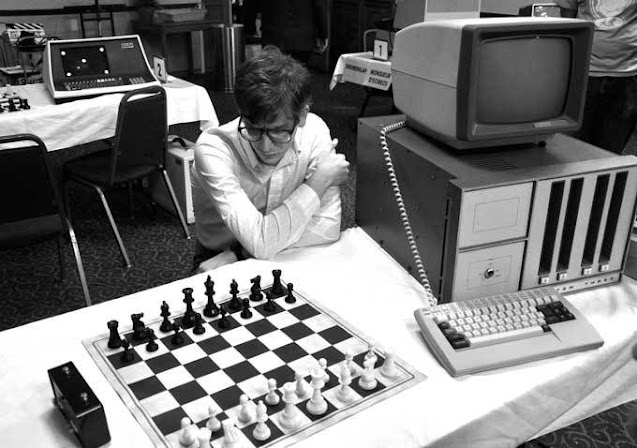Computer Chess
Director Andrew Bujalski carries off the conceit longer and better than I would've expected. What appears to be a 1970s surveillance camera captures a group of what are politely called nerds attending a chess tournament in a bland California hotel. Computer chess, complete with those giant PCs used back in the day. Students from CalTech, MIT, and other universities pit their programs in a race for a $7500 prize. One team has the first ever female competitor. There's a videographer capturing the event. Also, two suspicious guys who supply drugs. Their wares enhance late night discussions about the effects of Artificial Intelligence on mankind.
Bujalski, who also wrote the script for 2013's COMPUTER CHESS, apparently nailed the particulars. I've read that real life programmers slapped their knees in hilarity. Yes, this movie is a comedy. Some of it in the style of shows like The Office. Much of the time it feels like one of Christopher Guest's "mockumentaries." These are good things. The eccentric humor develops quite naturally out of this group of socially awkward geniuses, which includes the brash Michael Papageorge (Myles Paige), who blatantly tells the master of ceremonies that his panel discussions are boring and through some mix-up finds himself without a room, forever stealing a place to sleep. Because of this he ends up a participant in the other weekend convention, an encounter group.
Much of the focus is on Peter (Patrick Riester), shy and seemingly the youngest of the group, trying to figure out why the program TSAR is malfunctioning. He finds himself in a hotel room with a swinging middle aged couple, in a scene of great comedic discomfort. COMPUTER CHESS finds its laughs mainly in how the crasser elements of society fail to understand those geeks who eventually designed well, everything we're obsessed with today. As the film progresses, more serious themes emerge (though still in a humorous vein). This may or may not occur before scene where Martin Beuscher (Wiley Wiggins) discovers (in a flashback) that the computer is asking him questions. Machine learning, indeed?
Bujalski employs use of split screen, out of sync dubbing, image as if a photographic negative, and even one sequence in color. These choices can be explained, and I'd love to hear Bujalski's explanations. His film has more substance than I would've guessed. This low-fi mumblecore exercise does in fact amount to more than just easy satire.



Comments